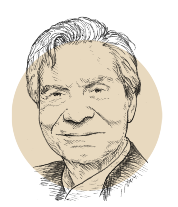To illustrate this paradox, we might begin with the principle of elections, since France has just finished its presidential race and votes of some sort are always being held in the United States. A drive through American cities and towns is enough to see campaign signs popping up for primaries or the election of a sheriff or a judge. Voting in our authentic democracies is not limited to presidential elections; it is a permanent merry-go-round operating at all levels of society, and it involves an equally constant participation of voters and candidates. To cite the French case, remember that more than 500,000 citizens are elected locally to the daily administration of our 34,955 communes: Democracy is an everyday thing for us, just as in American counties. It is important never to reduce democracy to the naming of a head of state alone.
Here is another erroneous objection: Political leaders are no longer what they used to be. It is thought that they have become mediocre, and that the office no longer attracts the best of their generation, “the best and the brightest,” as the journalist David Halberstam wrote concerning the generation of John F. Kennedy. But this judgment is based on a classic idealization of the past. It is also unimportant, because the virtue of democracy has less to do with the supposed qualities of a leader than with the strength of institutions, of which he or she is both a guardian and a prisoner. The fact that anyone can become or aspire to be president is a virtue of democracy, in which leaders operate under the law and not above it. The reverse is true under Russian and Chinese tyrannies, where a single man can reshape society, generally for the worse and for a long time.
Yes, for a long time! Democracies alone have resolved the essential question for any political regime: the art of getting rid of a leader at a time set in advance and without bloodshed (January 6, 2021, at the Capitol, was a rare exception, and led to nothing). The British philosopher Karl Popper explained this half a century ago. The virtue of democracy, he said, is not to choose the best leader, but to get rid of those who fail. This prevents leaders from becoming intoxicated with their own power and does not leave them the time to model society according to their fantasies. Preordained departure from office has the further considerable advantage of offering consolation to the losing side, generally half of the country. Those who are dissatisfied with the result of any election can simply wait for the next one. There is no point in calling for tyrannicide or for civil war; patience is enough. The choice of patience over civil war is perhaps the main civilizing quality of the democratic regime.
Here is another recurrent objection: the disappearance of great men, the shortness of terms, and the incessant electoral agitation – are these not a great source of weakness in the face of strong regimes? Ancient and contemporary history teach the contrary: What seems to be our weakness is in fact our strength. This is shown today by the Covid pandemic and the Russian tyrant’s repeated attacks on his neighbors. Concerning the pandemic, it is because we quarreled with each other in every democratic regime over masks, lockdowns, and vaccines that we have managed, thanks to our experiments and our errors, to more or less beat the virus. Dictators, who cannot admit that they know nothing, are still dealing with the ravages of Covid-19, which today ceaselessly afflicts the peoples of Russia and China on a scale that is vast but hidden. Wars obey this same logic of the absurd: The tyrant, who makes decisions alone and sees himself as invincible, lies, attacks, and gets bogged down. And is he ever received as a liberator? Never, neither in Hong Kong nor in Kyiv. Democracies are slow to awaken and they procrastinate, but at the end of the day they prevail – not only on the ground but, more importantly, in the hearts of the people.
These philosophical and historical reminders shed light on our present world; we are not going back to some cold war. During the Cold War, two ideologies faced off, liberal democracy vs. communism, both claiming universality. This is no longer the case, since Russia no longer proposes a model of society, and the Chinese model applies only to the Chinese. Only liberal democracy has maintained, intact, a universal vocation that includes its imperfections. Imperfection is its very strength, just as self-criticism makes us smarter than certitudes. Still, if we were to point to a fault in liberal democracies, it would have to do with what we now call communication. Democracies do not know how to explain the extent to which their contradictions constitute their virtue.
Editorial published in the May 2022 issue of France-Amérique. Subscribe to the magazine.












